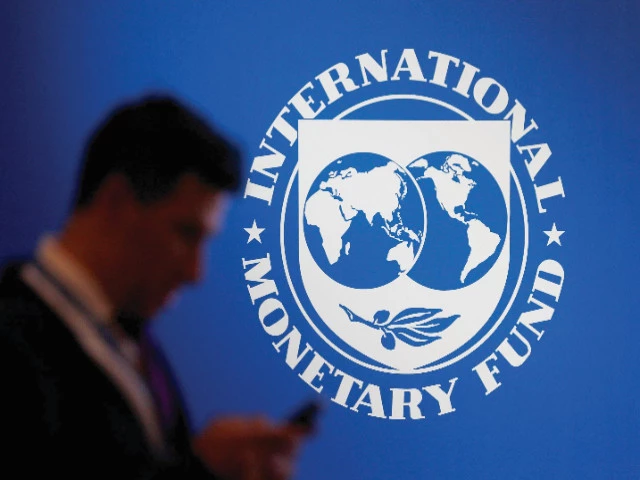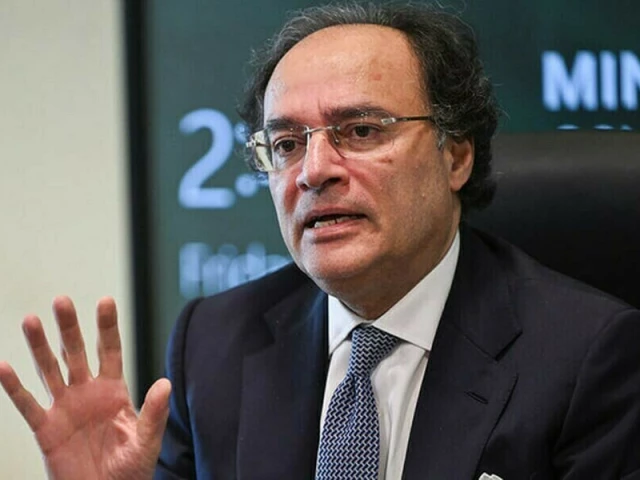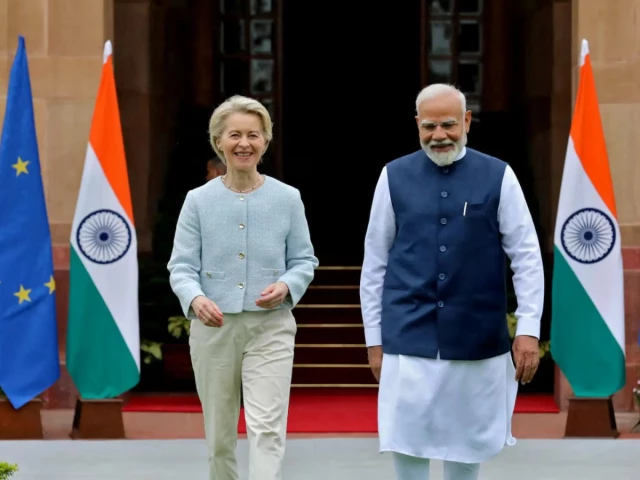Business
Economy in ‘good spot,’ claims FinMin Aurangzeb amid global support | The Express Tribune
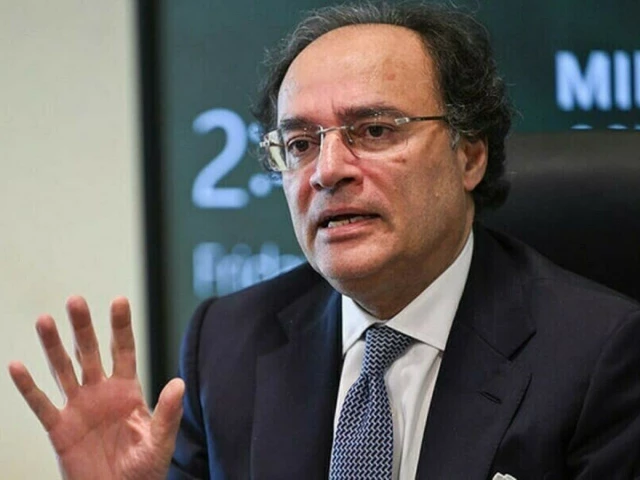
Says macro-economic stability, ‘geopolitical tailwinds’ leave Pakistan poised for growth, investment
In a virtual address at the second edition of the Pakistan International Maritime Expo and Conference in Karachi, Federal Minister for Finance Muhammad Aurangzeb said on Tuesday that Pakistan is enjoying a moment of convergence between internal economic stability and favourable international dynamics.
“Where we are as a country, we find ourselves in a good spot at this point and time because there is a confluence of factors,” he said.
وفاقی وزیر خزانہ سینیٹر محمد اورنگزیب کا کہنا ہے کہ پاکستانی معیشت درست سمت کی جانب گامزن ہے اور بلیو اکانومی ملکی معیشت کےلیے گیم چینجر ثابت ہوگی۔پاکستان انٹرنیشنل میری ٹائم ایکسپو 2025 سے ورچوئل خطاب کرتے ہوئے وزیر خزانہ محمد اورنگزیب کا کہنا تھا معاشی استحکام کے لیے ڈھائی سال… pic.twitter.com/j62Q3Vtbm7
— Times of Karachi (@TOKCityOfLights) November 4, 2025
He pointed to what he described as “macroeconomic stability combined with geopolitical tailwinds” as the main drivers of this improved position.
Aurangzeb underlined that the country’s long-standing relationships with its partners can now be transformed from mere government-to-government engagements into tangible trade and investment flows. “Our traditional partners, who have helped us through thick and thin … we find ourselves in a spot that we can now… move from government-to-government (G2G) discussions to trade and investment flows into the country,” he told the conference.
On the subject of global confidence in Pakistan’s economic management, Aurangzeb said that after a gap of two to three years, three major global rating agencies are now aligned in their view, reporting upgrades this year and offering stable outlooks. “After a hiatus of two to three years, we have three global rating agencies which are fully aligned … in terms of the upgrades we have seen over the course of this year, but also their outlook, which is stable for Pakistan’s economy,” he said.
He stated that the country is currently a part of an International Monetary Fund (IMF) programme, and that the recently announced staff-level agreement was evidence of international confidence in Pakistani authorities.
Blue Economy
Turning to sectoral strategy, Aurangzeb described the “blue economy” as a potential game-changer for Pakistan. He said the sector currently accounts for roughly $1 billion (0.4-0.5% of Gross Domestic Product [GDP]) and aims to scale significantly. “We are hovering at about 0.4 to 0.5 per cent of the national gross domestic product, which equates to roughly $1 billion,” he said, adding that Pakistan’s “real potential” was as high as $3 trillion.
The minister also emphasised that policy consistency would be central to achieving these goals. “As the finance minister, I would like to assure you … that we are going to ensure that there is policy consistency. Whatever we say, we see it through the cycle. So I think that is going to be a very important part of how we are going to take this discussion forward,” he said.
He outlined plans for seafood exports, currently sitting at approximately $500 million, to reach $2 billion over the next three to four years. “Getting that to $2 billion over the next three to four years was a very achievable milestone,” he said.
Further strategic pillars identified included modernising ports and logistics, digitisation, renewable energy and innovative financing such as blue bonds and blended finance.
The remarks signal Pakistan’s intent to harness a window of favourable external conditions and internal reform momentum to accelerate growth. However, ambitious targets and promises of sustained policy consistency will demand careful execution, strengthened institutional frameworks and deeper market confidence.
Business
Air India plane’s fuel control switches found to be okay: Civil Aviation Ministry

Air India Plane’s Fuel Control: The Ministry of Civil Aviation on Tuesday issued a rejoinder on the news item relating to the purported malfunction of the fuel cut-off switch on Air India’s Boeing B787-8 aircraft VT-ANX in London.
The rejoinder states that, based on the Boeing recommended checks to establish the serviceability of the fuel control switch, Air India engineering observed that: “Both left and right switches were checked and found satisfactory, with the locking tooth fully seated and not slipping from RUN to CUTOFF. When full force was applied parallel to the base plate, the switch remained secure. However, applying external force in an incorrect direction caused the switch to move easily from RUN to CUTOFF, due to the angular base plate allowing slip when pressed improperly with finger or thumb.”
In addition, based on Boeing’s communication, the pull-to-unlock force was checked on the fuel control switch using the recommended procedure on the involved fuel cut-off switch, the fuel control unit to be installed, and the fuel cut-off switch of another aircraft. In all cases, the pull-to-unlock force was found within limits. These inspections were carried out in the presence of DGCA officers, the ministry’s statement said.
The video currently circulating on social media was analysed in light of Boeing’s recommended procedures, and it was observed that the procedure demonstrated in the video being circulated is incorrect, the statement observed.
The airline is being advised to circulate the Boeing recommended procedure for the operation of the Fuel CUT OFF switch to its crew members, the statement said.
On February 1, 2026, Air India B787-8 aircraft VT-ANX operated flight AI 132 (London- Bengaluru). During engine start in London, on two occasions, the crew observed that the fuel control switch did not remain positively latched in the ‘RUN’ position when light vertical pressure was applied. On the third attempt, the switch latched correctly in ‘RUN’ and subsequently remained stable. Before continuing with the rest of the procedure, a physical verification was performed by the crew to confirm that the switch was fully and positively latched in the ‘RUN’ position. No abnormal engine parameters, cautions, warnings, or related system messages were observed during engine start or at any time thereafter.
The operating crew member was briefed on the observation, unnecessary contact with the switch was avoided, and engine indications and alerting systems were closely monitored by the crew for the remainder of the flight. The flight was completed without incident.
After landing at Bengaluru, the crew reported the defect in the PDR. Air India referred the matter to Boeing for further guidance, after which the airline’s engineering department carried out the checks in the presence of DGCA officials, the statement said.
Business
India-US trade deal: Some key questions that still remain unanswered – The Times of India

India-US trade deal: While the announcement of India-US trade deal brought a welcome relief rally in domestic stock markets and cheered exporters, a lot still remains unknown about the key details of the trade agreement. The biggest takeaway from US President Donald Trump and Prime Minister Narendra Modi’s social posts is that the reciprocal tariff on Indian exports has been reduced to 18% effective immediately. Commerce Minister Piyush Goyal’s press conference on Tuesday also offered little details, though he was clear that sensitive sectors of agriculture and dairy will continue to be protected. India has secured a “very good” trade agreement with the United States, placing it in a more favourable position compared with rival nations, Goyal said.Countries that compete closely with India in labour-intensive industries on the global stage include China, Vietnam with tariffs of 20%, Malaysia at 19%, Bangladesh at 20%, and Cambodia and Thailand, both facing duties of 19% each.Trump’s post on Truth Social made several claims on tariff rates, India’s oil purchase strategy, halting of Russian crude imports, stepping up purchase of US goods and much more. India on its part has not endorsed most of these claims, and several questions related to the India-US trade deal remain unanswered:
Q.1 Will India stop buying Russian crude oil?
What Trump said: “He (PM Modi) agreed to stop buying Russian Oil, and to buy much more from the United States and, potentially, Venezuela. This will help END THE WAR in Ukraine, which is taking place right now, with thousands of people dying each and every week!”What we know so far: India has not officially said that it will stop buying Russian crude oil. Indian refiners have not received any directive from the government to halt purchases of Russian crude and would require time to wind down transactions that are already underway, two refinery sources told Reuters.Also Read | India-US trade deal: 25% penal tariffs linked to Russian oil gone? White House confirms, but there’s a catchIndia’s imports of Russian crude had touched a high of about 2 million barrels per day in June last year. Trump said on Saturday that India would purchase oil from Venezuela. However, refinery officials noted that only Reliance Industries and Nayara Energy possess the technical capability to handle large volumes of heavy crude. According to the sources quoted by Reuters, state run refiners cannot easily switch to Venezuelan oil and would be able to substitute less than 10% of the volumes currently sourced from Russia. Trade data showed that India’s Russian oil imports slipped to a two year low in December.
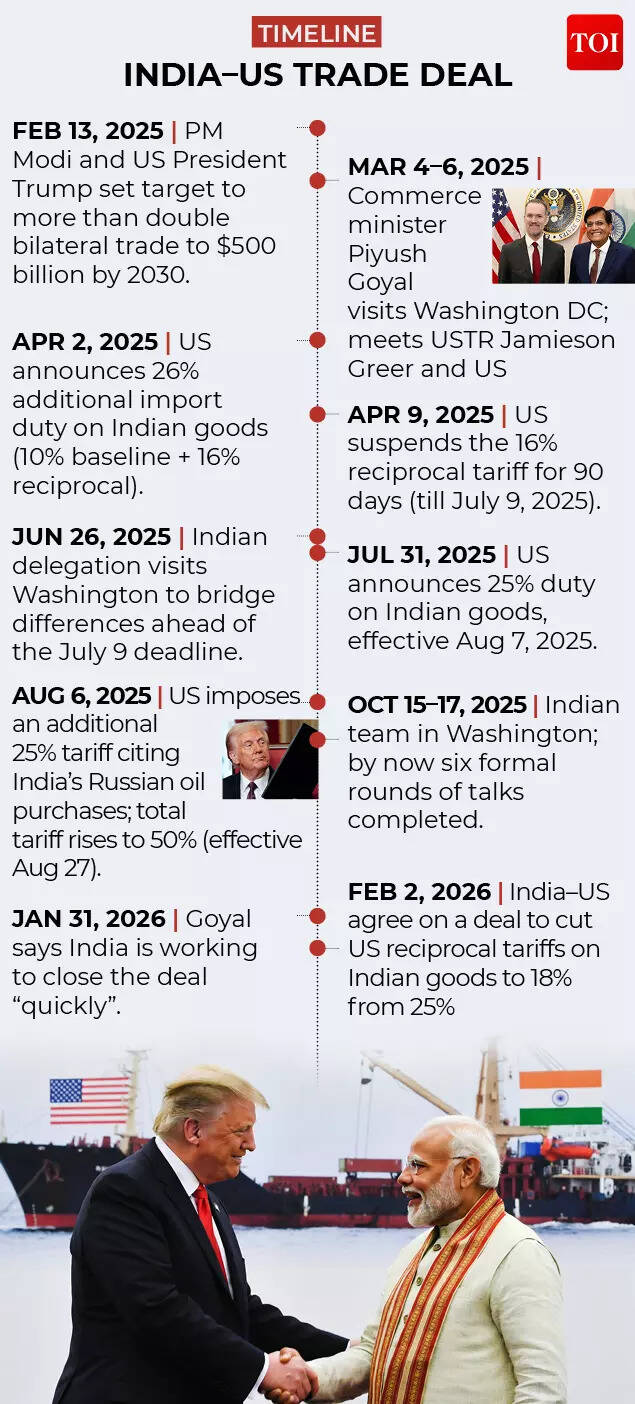
India-US trade deal timeline
Indian refiners have increasingly turned to suppliers in the Middle East, Africa and South America as they gradually cut back on Russian crude purchases, a trend that became evident last month.Meanwhile, Russia has also not received any official communication from India indicating any move to halt purchases of Russian crude, Kremlin spokesperson Dmitry Peskov said on Tuesday.”“We haven’t heard any statements from New Delhi on this matter yet,” Peskov said.The Kremlin spokesperson added that Moscow plans to continue strengthening its relationship with India across all areas of cooperation.
Q2. Will India reduce tariffs on American goods to zero?
What Trump said: “Out of friendship and respect for Prime Minister Modi and, as per his request, effective immediately, we agreed to a Trade Deal between the United States and India, whereby the United States will charge a reduced Reciprocal Tariff, lowering it from 25% to 18%. They will likewise move forward to reduce their Tariffs and Non Tariff Barriers against the United States, to ZERO.”Commerce Minister Piyush Goyal has not clarified on whether tariffs on US goods to India will be brought down to nil. In his statement to the media, he explained that the final details of the trade deal are still being worked out and a joint statement will be issued soon.Also Read | Lower than Pakistan, China: How trade deal with US gives India its edge back against South Asian competitors PM Modi’s social media post after Trump’s trade deal announcement also did not talk of tariff barriers on US goods. It welcomed the reduction of tariffs to 18%.US Trade Representative Jamieson Greer said on Tuesday that the Trump administration is in the process of formally concluding the trade pact announced with India, while pointing out that New Delhi continues to retain safeguards for its agricultural sector.In an interview with CNBC, Greer said the agreement was now being put into final form. “We’ll finish papering it, but we know the specifics, we know the details,” he said. He also noted that as the wider deal progresses, India “is maintaining some protection around agricultural goods.”Greer added that the agreement would substantially liberalise India’s industrial market, with a sharp reduction in duties on manufactured products.“India’s industrial goods tariffs will go to zero from 13.5%,” he said.
Q3. Will India buy US goods worth $500 billion and what’s the timeline for this?
What Trump said: “The Prime Minister also committed to “BUY AMERICAN,” at a much higher level, in addition to over $500 BILLION DOLLARS of US Energy, Technology, Agricultural, Coal, and many other products.” While Trump’s post mentions agricultural products, Piyush Goyal that the India-US trade deal will protect the agricultural and dairy sectors. Also, there is no word from India on any commitments to step up US energy, technology, coal purchases.As Global Trade Research Initiative (GTRI) notes: Trump claims India will reduce tariffs and non-tariff barriers on US products to zero, but does not specify how many products are covered under India’s commitment. India has previously resisted opening sensitive sectors such as food grains, genetically modified products, and other regulated imports.Also Read | India-US trade deal: Top 7 points Trump says he agreed on with PM Modi“Trump says India will buy over $500 billion of US goods. At present, India’s annual imports of goods and energy from the US are under $50 billion. Reaching $500 billion would likely require more than 20 years, suggesting the figure refers to a long-term aspiration rather than a near-term commitment,” GTRI says.More clarity on key aspects of the India-US trade deal are expected to emerge in the coming days – for now exporters are breathing a sigh of relief that dealings with India’s largest trading partner are back on track.
Business
Union hits out as Mossmorran plant ends production

The Unite trade union has criticised oil giant ExxonMobil as it shuttered its Mossmorran plant.
The Fife Ethylene Plant was due to close this month, but the union claimed it was shut down early, with production ending on Monday.
Exxon announced the impending closure last year, with around 400 jobs at risk as a result, claiming it was no longer financially viable.
No immediate job losses are expected as a result of the end of production on Monday, but it is understood 69 staff will leave at the end of April, with 90 remaining to complete the decommissioning of the site, who will then leave in three waves up until the expected completion in early 2028.
According to the firm, 20 staff have chosen to relocate to other parts of ExxonMobil’s UK operation.
Along with the firm’s own staff, around 250 contractors worked on the site.
In a statement, a spokesman for the company said: “After more than 40 years of operations, Fife Ethylene Plant permanently shut down production on February 2.
“In the months ahead the plant will be fully decommissioned and made safe for dismantling. We anticipate this process to be completed by early 2028.”
But the trade union hit out at the firm, claiming it had ended production early.
ExxonMobil had previously planned to close the plant on February 16, but it is understood an operational issue with a unit on the site, which would have required multiple days for repair and to restart, was the reason for the early closure.
Unite’s general secretary Sharon Graham said: “This is another nail in the coffin of the oil and gas industry, with jobs haemorrhaging on this government’s watch.
“Unite has said repeatedly that the government should not be letting go of one rope before it has hold of another.
“Importing oil and gas while we offshore our carbon responsibilities is quite frankly an abdication of responsibility which makes us more vulnerable and betrays workers.
“ExxonMobil’s decision to close Mossmorran ahead of schedule is a disgrace and a betrayal of its workers.
“This is an enormously profitable multi-billion pound company and this unnecessary decision will have a devastating impact on the local community in Fife.”
Deputy First Minister Kate Forbes said the news would be “difficult” for workers, but the Scottish Government was “doing all it can to support them”.
“I have written to worker representatives to assure them of our support and to ExxonMobil to ask that the workforce is prioritised,” she said.
“We have committed £9 million over three years to mitigate the impacts of the plant’s closure, with our Partnership Action for Continuing Employment providing skills and employability support to workers.
“This funding will also support the site’s long-term future, with Scottish Enterprise identifying new investment opportunities.”
Scottish Tory business spokesman Murdo Fraser said the closure was a “terrible blow” for the area and the workers.
“As with Grangemouth, the SNP government promised swift action to protect workers and the local community, but their task force didn’t even meet until last week,” he said.
“These closures are the inevitable result of Labour and the SNP having created a hostile environment for businesses, especially those connected with the oil and gas sector, by piling on punitive taxes and regulations.
“Ministers must now ensure that there is decisive action to support those affected, and not merely empty promises.”
-

 Sports1 week ago
Sports1 week agoPSL 11: Local players’ category renewals unveiled ahead of auction
-

 Entertainment7 days ago
Entertainment7 days agoClaire Danes reveals how she reacted to pregnancy at 44
-

 Sports7 days ago
Sports7 days agoCollege football’s top 100 games of the 2025 season
-

 Business1 week ago
Business1 week agoBanking services disrupted as bank employees go on nationwide strike demanding five-day work week
-

 Politics7 days ago
Politics7 days agoTrump vows to ‘de-escalate’ after Minneapolis shootings
-

 Tech1 week ago
Tech1 week agoBrighten Your Darkest Time (of Year) With This Smart Home Upgrade
-

 Sports7 days ago
Sports7 days agoTammy Abraham joins Aston Villa 1 day after Besiktas transfer
-

 Entertainment7 days ago
Entertainment7 days agoK-Pop star Rosé to appear in special podcast before Grammy’s



